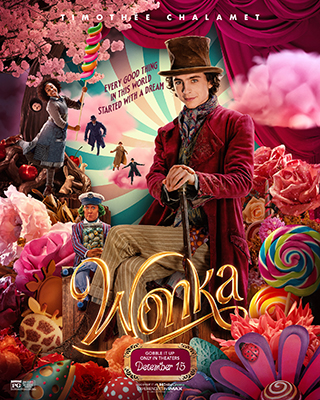Like a live-action Disney musical set against a Dickensian backdrop, “Wonka” is too eager to entertain and good-natured for me to be a Grinch in this season of giving. With chaste cartoon humor and songs that don’t completely suck, “Wonka” had enough charm to disarm me.
For fans of Roald Dahl’s Willy Wonka character indelibly imprinted in our minds by Gene Wilder from 1971’s “Willy Wonka and the Chocolate Factory,” the origin story for the manic candy maker was probably the last thing you were looking for. While our first fascination with Wonka may have been his fantastical factory, it was the mischief he made setting gluttonous traps for greedy children that was the real draw. It may have set a sinister tone, but Wonka turning kids into blueberries or shrinking them to fit inside televisions had a perverse pleasure.
I knew “Wonka” would avoid a darker tone and I was right. Setting aside any hint of sadism to set up a possible franchise by keeping it kid-friendly, “Wonka” still works by being decidedly Disneyesque. In a story of an entrepreneur creating a fantasyland, Wonka resembles Walt Disney (his factory like Disneyland). So, director Paul King (of “Paddington” film fame) embracing Disney’s style in “Wonka’s.” story and scenic design makes perfect sense.
The film begins with Willy Wonka (Timothee Chalamet) singing atop a mast sail as his ship steers toward a Victorian-styled London (it’s not the era, just used for an old-timey feel). Willy sings about setting up a chocolate shop, as making chocolate has always been his dream. While I wrung my hands in anticipation of eviscerating Willy’s raison d’etre, a sappy sentimental reason plus explaining his nautical voyage to collect exotic candy-making ingredients to concoct magical confections tempered the torment I was about to inflict on the idea.
Finding a room to rent, Wonka is quickly conned by landlady Mrs. Scrubbit (Olivia Coleman) and made an indentured servant for owing money. Sentenced to scrub laundry in the boarding house’s basement with equally unlucky tenants, he soon finds friendship with an orphan named Noodle (Calah Lane), who helps Wonka escape to a nearby square to give free samples of his candy to the congregating townsfolk like a competing drug dealer against London’s candy cartel. The three established chocolatiers- led by Slugworth (Paterson Joseph)- soon declare war on Wonka and use a corrupt Chief of Police (Keegan-Michael Key), bought with bon-bons, to do their bidding. Can the London’s elite confectioners stop Wonka before he opens shop?
As mentioned, the humor in “Wonka” is naively cartoonish (the Chief of Police gaining weight with candy bribes is a running joke) and new songs are created to cover clunky dialogue- again, everything you’d expect from a Disney musical. References to what you know of Wonka (like Slugworth or the golden ticket) are noted but not overdrawn: this is true of future Wonka factory worker, the Oompa-Loompa. Keeping with the Disney theme, Hugh Grant plays the Oompa-Loompa as a guiding hand to Wonka much like Jiminy Cricket was to Pinocchio (appearing halfway into the film, the role is more an extended cameo). By not depending heavily on Wonka legend yet still staying faithful, director King and co-writer Simon Farnaby’s focus on an independent story idea gives the movie its own energy. In the same vein, Chalamet smartly plays Wonka straight, avoiding eccentric or manic moves to emulate Gene Wilder that might cause unintended embarrassment.
“Wonka” wins with its tune-filled, comedic cartoon tone and kids will be wrapped around its finger. For us older folks, we can enjoy “Wonka’s” inoffensiveness as we would an everlasting Gobstopper.

